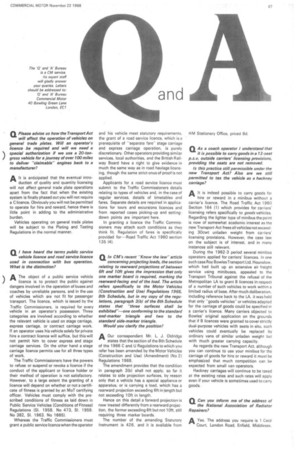a I have heard the terms public service vehicle licence and
Page 69

If you've noticed an error in this article please click here to report it so we can fix it.
road service licence used in connection with bus operation. What is the distinction?
AThe object of a public service vehicle
licence is to protect the public against dangers involved in the operation of buses and coaches by unreliable persons, and in the use of vehicles which are not fit for passenger transport. The licence, which is issued by the Traffic Commissioners, is required for every vehicle in an operator's possession. Three categories are involved according to whether the relevant vehicle is used on stage carriage, express carriage, or contract carriage work. If an operator uses his vehicle solely for private hire a contract licence will suffice, but this will not permit him to cover express and stage carriage services. On the other hand a stage carriage licence permits use for all three types of work.
The Traffic Commissioners have the powers to refuse or suspend or revoke a licence if the conduct of the applicant or licence holder or their method of operation is not satisfactory. However, to a large extent the granting of a licence will depend on whether or not a certificate of fitness is granted by an mar certifying officer. Vehicles must comply with the prescribed conditions of fitness as laid down in Public Service Vehicles (Conditions of Fitness) Regulations (SI. 1958. No 473, SI. 1959. No 382, SI. 1963. No 1665).
Whereas the Traffic Commissioners must grant a public service licence wh en the operator and his vehicle meet statutory requirements. the grant of a road service licence, which is a prerequisite of "separate fare" stage carriage and express carriage operation, is purely discretionary. Other operators providing similar services, local authorities, and the British Railway Board have a right to give evidence in much the same way as in road haulage licensing, though the same strict onus of proof is not a pp lied.
Applicants for a road service licence must submit to the Traffic Commissioners details relating to types of vehicles and, in the case of regular services, details of timetables and fares. Separate details are required in applications for tours and excursions licences and from reported cases picking-up and settingdown points are important here.
In granting a licence the Traffic Commissioners may attach such conditions as they think fit. Regulation of fares is specifically provided for—Road Traffic Act 1960 section 135 (4).




















































































































